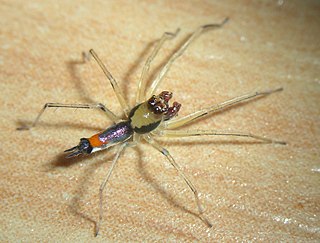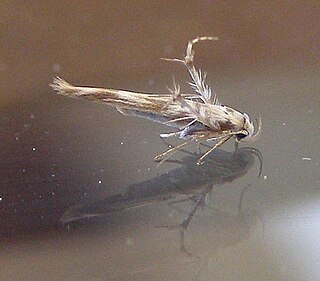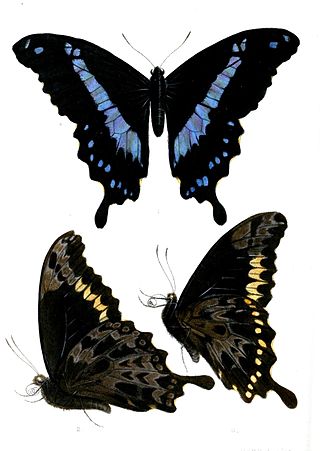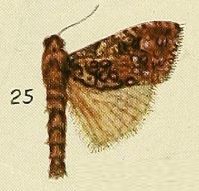
Ocimum is a genus of aromatic annual and perennial herbs and shrubs in the family Lamiaceae, native to the tropical and warm temperate regions of all 6 inhabited continents, with the greatest number of species in Africa. Its best known species are the cooking herb basil, O. basilicum, and the medicinal herb tulsi, O. tenuiflorum.

Asemonea is a genus of jumping spiders that was first described by Octavius Pickard-Cambridge in 1869.

Stenaelurillus is a genus of jumping spiders that was first described by Eugène Louis Simon in 1886. Most species live in Africa, with some species found in Asia, including China. All species have two white longitudinal stripes on the carapace, and both sexes show strong bristles around the eyes. The name is a combination of the Greek sten- "narrow" and the salticid genus Aelurillus.

Palumbina is a genus of moths in the family Gelechiidae.

Neaveia is a monotypic butterfly genus in the family Lycaenidae which is endemic to the Afrotropical realm. Its only species, Neaveia lamborni, the pierine blue, is found in Ivory Coast, Ghana, Nigeria, Cameroon, the Republic of the Congo, the Democratic Republic of the Congo, Uganda, Kenya and Tanzania. Both the genus and species were first described by Hamilton Herbert Druce in 1910. The habitat consists of forests and open areas.

Toxophora is a genus of flies belonging to the family Bombyliidae (bee-flies). There are about 47 described species, distributed throughout the world, although they are most abundant in Southwestern United States and western Mediterranean. They are stout, robust flies with a hunchbacked form, with a body length of 6–12 mm and wings 4 to 7.5mm. Most species are black with banding or spots.
Allepipona is an Afrotropical genus of potter wasps.
Tenuopus is a genus of flies in the family Dolichopodidae. It is the only genus in the subfamily Tenuopodinae, which was created by Igor Grichanov in 2018. The genus was previously placed in the subfamily Neurigoninae, and it also shares some features of Peloropeodinae and Sciapodinae. All species are known from the Afrotropical realm.

Coniostola is a genus of moths belonging to the subfamily Olethreutinae of the family Tortricidae.
Crassuncus is an Afrotropical genus of moths in the family Pterophoridae.

Papilio hornimani, the Hornimans green-banded swallowtail or Horniman's swallowtail, is a species of swallowtail butterfly from the genus Papilio that is found in the highland forests of Kenya and Tanzania.

Papilio mackinnoni, the Mackinnon's swallowtail, is a species of swallowtail butterfly from the genus Papilio that is found in Kenya, Tanzania, Malawi, Zambia, Angola, Uganda, Zaire, South Sudan, the Republic of the Congo, Rwanda and Burundi.

Eurema floricola, the Malagasy grass yellow, is a butterfly in the family Pieridae. It is found in Sierra Leone, Ivory Coast, Ghana, Nigeria, the Democratic Republic of Congo, Burundi, Kenya, Tanzania, Zambia and on Madagascar, the Comoros, Mauritius, Réunion and the Seychelles. Its habitat consists of the forest/savanna transition zone.

Harma is a monotypic butterfly genus in the family Nymphalidae. Its one species is Harma theobene, the angular glider. It is found in Guinea, Sierra Leone, Liberia, Ivory Coast, Ghana, Nigeria, from Cameroon to Angola and in the Democratic Republic of the Congo, Uganda, Kenya, Tanzania, Malawi, Zambia, and Mozambique. The habitat consists of forests and heavy woodland.
Dinometa is an Afrotropical genus of moths in the family Lasiocampidae. It was erected by Per Olof Christopher Aurivillius in 1927, containing at the time only the species Dinometa maputuana, originally described by Wichgraf in 1906 as Gastroplakaeis maputuana. Two additional species, Dinometa abigailae and Dinometa ethani, were described in 2024 by Alexey Prozorov et al.

The Metarbelidae are a family of the Cossoidea also called the carpenter or goat moths, and is sometimes treated as a subfamily, Metarbelinae of the Cossidae. No synapomorphies are shared with the Cossidae based on adult morphology. The family Metarbelidae was first described by Embrik Strand in 1909.

Corus is a genus of long-horned beetles in the family Cerambycidae. There are more than 30 described species in Corus.

Camponotus rufoglaucus is a species of carpenter ant. It is found from many Afrotropical, Indo-Australian, Oriental, Palaearctic regional countries.
Afrohercostomus is a genus of flies in the family Dolichopodidae. Many of the species were formerly from "Hercostomus Group I", one of three groups of Afrotropical Hercostomus species created by Igor Grichanov in 1999.
Delopleurus parvus, is a species of dung beetle found in India, Sri Lanka and Nepal.












